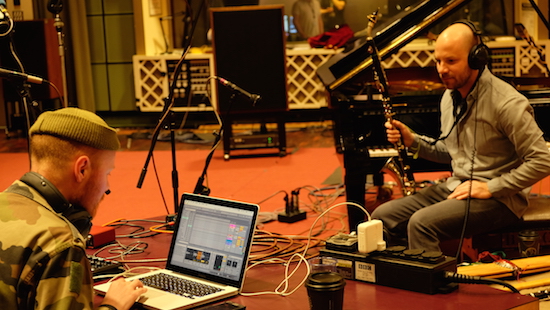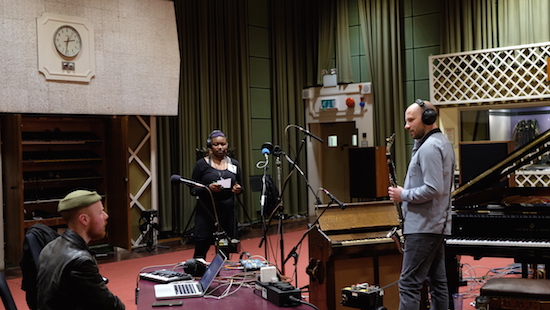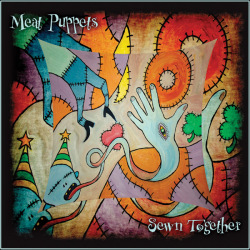The idea itself is simple but the results could easily range from the extraordinary to the mundane: take three artists from different disciplines, apply the limitations of time and challenge them to create new pieces of music. Such is the premise behind this session at the BBC’s Maida Vale studios that’s being recorded for Radio 3’s unique and increasingly popular music programme, Late Junction.
As a concept, it perfectly reflects the show’s conceit of mixing a wide and eclectic spectrum of music from across the globe, time periods and genres. Wide in scope, to be sure, this is music broadcasting at its boldest. Which makes it all the more apposite that today’s participants are The Quietus-championed
Wacław Zimpel, and Forest Swords’ Matthew Barnes, as well as performance poet and writer Belinda Zhawi.
There’s definitely a risk around putting three very different artists who have never met before and expecting them to create, yet any doubts that may surround the project are swiftly dispelled. With Barnes working on sound manipulation, he suggests developing a piece based around the concept of breathing. As he begins to create a variety of sounds, Polish musician and composer Zimpel alternates from a variety of instruments ranging piano, celeste, flutes and khaen. As the music begins to take shape, Zimbabwean Zhawi sets about writing prose to match the piece.
The end result is ‘Breath’, and the music simultaneously captures the idiosyncrasies of the three artists while finding common ground. Smiles are soon exchanged and with the first step successfully taken, Zimpel, Barnes and Zhawi ready themselves for their next challenge.
‘Dzoka’ finds Zhawi intoning in her native Shona, the primary language of Zimbabwe. Whatever tentative steps the trio made previously, here the work comes together far more quickly and with a sense of increasing confidence. Barnes’ off-kilter beats underpin the piece and Zimpel takes up the challenge before laying down his overdubs.
The final piece woven together in the time left is arguably the most compelling. ‘Mothership’ sees Zhawi, who has spent the best part of the day laying down verbal ideas in her notebook, exploring rhythm and meter with a passage that acknowledges the battle against the time and gaining the most from it. Picking up on the theme, Wacław Zimpel proposes stripping away the layers he’s added on. Space is what’s need and so his khaen is jettisoned in favour of sparser piano contributions as Barnes’ electronic rumbles create an ominous undercurrent.
The reaction of the participants at the end of the session is one of happiness. Here are three artists who, at the beginning of the day would’ve passed each other in street. Now, with three new pieces of resolutely 21st century music in the bag, talk turns to the need for a celebration. Their disciplines and backgrounds are different, yet their work has unified them. Such is the victorious result from such a simple ideas.
Why take part in this project?
Belinda Zhawi: I love working with music so it was natural for me to take part in this project.
Matthew Barnes: I had just finished touring my last record and I’d made the conscious decision to try and spend the next six months pushing myself out of my comfort zone and collaborate with people a bit more. The idea of doing something in a day really appealed to me. I checked out Belinda and Wacław’s work and thought it was a really smart way of working with different disciplines.
Wacław Zimpel: I checked out Belinda’s stuff on YouTube and really loved it and I already loved Forest Swords. It’s a great opportunity to do something together.
What objectives did you have with this project and how well did you achieve them?
BZ: I don’t think I had any set objectives other than coming here and being able to pull it off. I’ve worked on an improvisational level before and it’s a case of having your head right. I’m just happy to be here.
MB: I came to learn. You can learn things from other people such as other ways of thinking that maybe you wouldn’t have done on your own. Most of the stuff that I do is solitary being with other people and hearing their voices in the same room as me is quite a new thing for me. It’s something that I’d like to explore a bit more. I’ve found today to be really beneficial.
WZ: I’ve recently started exploring electronic music. I built a studio in Warsaw and I’m learning different ways of processing sound. I very much like Matthew’s work and I’m sure I can take something from this.

What will you take away from this process and will it be applied to your own work in the future?
BZ: I’m intrigued by how spaces and the voice work within music. Today was great exercise in stepping back and then stepping back in. And I’ve also done a lot of listening.
MB: I think it’s part of gradual process for me of learning to work with other people, and letting them into my world. Communication is the thing that I’ll take away from this. I think that over the coming months I’m going to be reflecting on this experience and finding something useful.
WZ: I’ve collaborated with poets before but Belinda has an incredible sense of rhythm. I think we all have a common sense of space and timing. I’ll definitely take away the memory of the vibe we shared here. It was instant and great. Our individual contributions blended beautifully together and it was like another world.
I deeply believe that spaces accumulate the energy of people who were there before and being at the Maida Vale studios has been totally uplifting. I’m surprised that I haven’t been overwhelmed by the sense of history here. It didn’t worry me; I just fed off the vibe of the place. There are good thoughts and memories here and I think they’re helping each subsequent musician who comes here. You can leave something here for the next musician to pick up.



